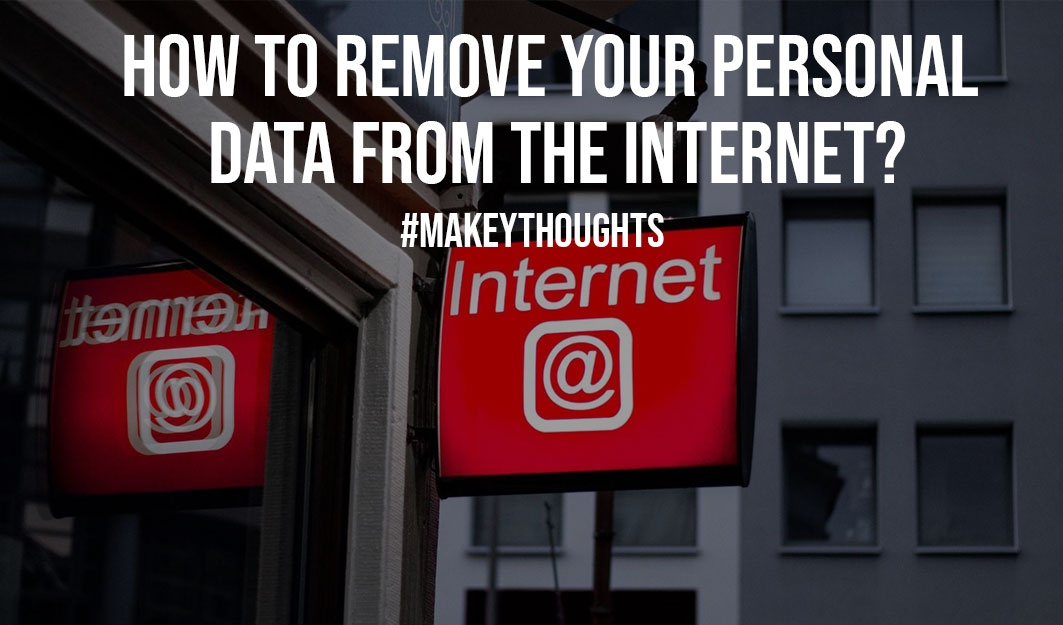How to Remove Your Personal Data from the Internet?
There is a lot of your stuff available on the web ranging from sensitive banking information to awkward pictures that you do not want on the internet anymore. Making this kind of information vanish from the internet lowers the chances of some cybercriminal finding and using this information against you for iniquitous reasons.
Here are some of the steps to keep yourself protected online and to remove personal information from the internet
What happens when Personal information is available on the internet?
When criminals get a hold of your details, they can use it to wreak havoc on your personal life including personal image, and financial image, or even try stalking you in real life.
Following are some of the ways cybercriminals might get your personal data from the internet:
Data Contravention
Such contraventions occur when the data is breached by certain individuals and they access the databases where all your information is stored. Cybercriminals then steal and sell personal information on the deep or dark web.
The information may contain names, financial records, medical records, or email addresses of any people, be they rich or not.
Also Read: Role of Artificial Intelligence in Data Privacy
Data Broker
There are companies present which find and collect data from random people. They collect every piece of information they can legally obtain and then compile it online.
After doing so, this data is then sold for a fixed amount on different websites. The data can be names, date of birth, telephone numbers, addresses, marriage records, life history, social media profiles, etc.
Social Media Profiles
The most vulnerable information present on the internet is on your social media profiles. The information shared there allows cybercriminals to commit fraud on your behalf or access the information and sell it to authorities who can use the details for their own benefit.
Your social media information may contain data such as where you live, pictures of you, family pictures, plans for the weekend or vacation plans, etc.
To keep yourself safe from scams, you can remove yourself from social media sites or at least make your accounts private.
Web-Browsing
There is always a pop-up on social media or other sites asking for permission to enable cookies. These cookies are used to track your social media and internet activities and to filter ads according to your search and preferences. Furthermore, these cookies can also be used to track your activities by cybercriminals to use that information against you.
Erase personal information from the Internet
Removing personal data from the internet is a slow and long process. It does not happen overnight and takes a while. It can be impossible to erase all of your personal data from the web, some of it may always be present, but you can mostly take it off.
It may be difficult at first to be without any social presence online but it will enable you to keep your financial and personal details private and secure.
Remove Social Media Accounts
Note down all the social media accounts you are on and start removing them one by one. Visit each of the social media websites and go into their application settings. From there either remove or deactivate your account. Keep some information public such as your name, and remove all your financial and bank information from the account.
If it is becoming impossible to deactivate your account, try to change your account name and details to random numbers and words which make no sense. If you don’t want to delete accounts, go through the settings to make them private.
Opt-out of data brokers
Remember that those sites display your info legally as they obtain it from open sources. But you can remove your profiles from most of them. Just make a list of data broker sites, visit them one by one and find the ‘remove my info’ page. You can start with Nuwber.
If that sounds like too much of a task, you can hire a service that will do it for you.
Erase Unnecessary Applications
There are many applications on your mobile device that collect a lot of your personal information from time to time. The details can include your name, email address, habits, or geographical location.
This information can be useful for a cybercriminal and can be used against you by anyone. If you decide that an app shouldn’t be allowed to have your information, go to its settings and try to find where to disable the app from collecting your data.
It is also time for you to keep a close check on any application’s privacy settings as camera permission may be a must for the camera app, but it has little to do with the maps application. If you find any such application accessing unnecessary settings, disable them. Furthermore, deleting applications that are seldom used clears memory in your phone allowing for other useful applications to be installed.
Keep in mind that uninstalling an application does not ensure that your personal information is deleted by the application servers. Check the privacy settings and account settings again to make sure you properly delete your data from the servers.
Erase Cookies
“Cookies” is a technology that keeps a track of your online habits and helps in providing information about ads related to your searches. If you want to keep an eye on that tracker and do not want the information to be stored and tracked, use any security software to disable cookies and block online tracking.
However, one thing should be noted: the browsing activity will be visible to the websites that are visited and to the network provider.
Check your Computer Data
There is a lot of your personal information stored on your devices and browsers. Try regularly checking that information and removing it from your computer and other devices. Clean your browser history, and install antivirus software that keeps track of your internet browsing and what contents are being saved.
Remove Out of Date Search Results
A lot of information can also be accessed by searching for you on all the search engines through data broker websites or social media platforms and even cached images. But you can file a request to keep your information out of the search results. This does not work 100% but it is worth a try.
Also Read: Mobile Security: Android vs. iOS – Which One Is Safe?
Conclusion
Removing private information from the internet will only let you skim off the top layer of the internet. Use a secure VPN for advanced protection when transferring files or on your phone or personal computer. It will increase your peace of mind and keep you away from online problems for a long while.







